Heel Pain Can Be Treated!
Are Certain People Susceptible to Gout Attacks?
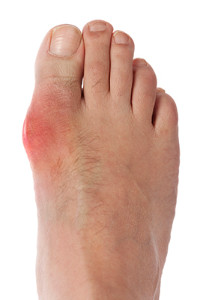 Gout is caused by an excess of uric acid that typically collects in the joints of the big toe. This commonly causes severe pain as a result of the inflammation around the big toe and surrounding areas. The majority of people who are afflicted with gout have a condition that is referred to as under-excretors, which is the inability to eliminate excess uric crystals from the urine. People who may be affected with this are diabetics and patients who may be obese or have heart disease. When certain types of foods are ingested, gout attacks may be more likely to occur. These may include shellfish, red meat or excessive alcohol. In severe and frequent gout attacks, small crystals may form in the kidneys, which may gradually increase in size to become kidney stones. If you have pain in your big toe and it appears to be red and tender, you may be experiencing a gout attack. It’s suggested to consult with a podiatrist as quickly as possible to discuss the best treatment options for you.
Gout is caused by an excess of uric acid that typically collects in the joints of the big toe. This commonly causes severe pain as a result of the inflammation around the big toe and surrounding areas. The majority of people who are afflicted with gout have a condition that is referred to as under-excretors, which is the inability to eliminate excess uric crystals from the urine. People who may be affected with this are diabetics and patients who may be obese or have heart disease. When certain types of foods are ingested, gout attacks may be more likely to occur. These may include shellfish, red meat or excessive alcohol. In severe and frequent gout attacks, small crystals may form in the kidneys, which may gradually increase in size to become kidney stones. If you have pain in your big toe and it appears to be red and tender, you may be experiencing a gout attack. It’s suggested to consult with a podiatrist as quickly as possible to discuss the best treatment options for you.
Gout is a painful condition that can be treated. If you are seeking treatment, contact one of our podiatrists from PA Foot & Ankle Associates. Our doctors will treat your foot and ankle needs.
What Is Gout?
Gout is a form of arthritis that is characterized by sudden, severe attacks of pain, redness, and tenderness in the joints. The condition usually affects the joint at the base of the big toe. A gout attack can occur at any random time, such as the middle of the night while you are asleep.
Symptoms
- Intense Joint Pain - Usually around the large joint of your big toe, and it most severe within the first four to twelve hours
- Lingering Discomfort - Joint discomfort may last from a few days to a few weeks
- Inflammation and Redness -Affected joints may become swollen, tender, warm and red
- Limited Range of Motion - May experience a decrease in joint mobility
Risk Factors
- Genetics - If family members have gout, you’re more likely to have it
- Medications - Diuretic medications can raise uric acid levels
- Gender/Age - Gout is more common in men until the age of 60. It is believed that estrogen protects women until that point
- Diet - Eating red meat and shellfish increases your risk
- Alcohol - Having more than two alcoholic drinks per day increases your risk
- Obesity - Obese people are at a higher risk for gout
Prior to visiting your podiatrist to receive treatment for gout, there are a few things you should do beforehand. If you have gout you should write down your symptoms--including when they started and how often you experience them, important medical information you may have, and any questions you may have. Writing down these three things will help your podiatrist in assessing your specific situation so that he or she may provide the best route of treatment for you.
If you have any questions, please feel free to contact one of our offices located in Allentown, Easton, Northampton, and Chew Street in Allentown, PA . We offer the newest diagnostic and treatment technologies for all your foot care needs.
How to Care For Your Feet
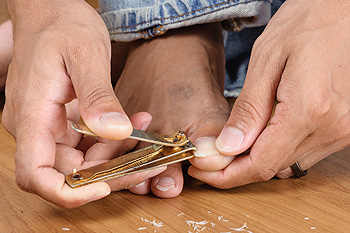 It is easy to forget to take care of your feet in the warmer weather. In the summer, your feet are more likely to be exposed to the sun and hot surfaces, which may cause them to become dry and rough. One of the best things you can do for your feet is to eliminate the dry skin cells. This can be achieved by exfoliating your feet once a week. This process will leave you with feet that are soft and renewed. Afterward, you should use a moisturizer on your feet to make sure they stay hydrated throughout the day. There are several types of pumice stones available for sale, and it’s suggested to have one in shower that can be used frequently. Adequately moisturizing your heels are crucial because the heels bear the majority of the weight. The heel also has a thick layer of skin protecting it, and this skin is less penetrable which makes moisturizing difficult. Therefore, it will take more effort to ensure that moisture is locked into the skin.
It is easy to forget to take care of your feet in the warmer weather. In the summer, your feet are more likely to be exposed to the sun and hot surfaces, which may cause them to become dry and rough. One of the best things you can do for your feet is to eliminate the dry skin cells. This can be achieved by exfoliating your feet once a week. This process will leave you with feet that are soft and renewed. Afterward, you should use a moisturizer on your feet to make sure they stay hydrated throughout the day. There are several types of pumice stones available for sale, and it’s suggested to have one in shower that can be used frequently. Adequately moisturizing your heels are crucial because the heels bear the majority of the weight. The heel also has a thick layer of skin protecting it, and this skin is less penetrable which makes moisturizing difficult. Therefore, it will take more effort to ensure that moisture is locked into the skin.
Everyday foot care is very important to prevent infection and other foot ailments. If you need your feet checked, contact one of our podiatrists from PA Foot & Ankle Associates. Our doctors can provide the care you need to keep you pain-free and on your feet.
Everyday Foot Care
Often, people take care of their bodies, face and hair more so than they do for their feet. But the feet are a very important aspect of our bodies, and one that we should pay more attention to. Without our feet, we would not be able to perform most daily tasks.
It is best to check your feet regularly to make sure there are no new bruises or cuts that you may not have noticed before. For dry feet, moisturizer can easily be a remedy and can be applied as often as necessary to the affected areas. Wearing shoes that fit well can also help you maintain good foot health, as well as making it easier to walk and do daily activities without the stress or pain of ill-fitting shoes, high heels, or even flip flops. Wearing clean socks with closed shoes is important to ensure that sweat and bacteria do not accumulate within the shoe. Clean socks help to prevent Athlete’s foot, fungi problems, bad odors, and can absorb sweat.
If you have any questions please feel free to contact one of our offices located in Allentown, Easton, Northampton, and Chew Street in Allentown, PA . We offer the newest diagnostic and treatment technologies for all your foot and ankle needs.
What Causes Athlete’s Foot?
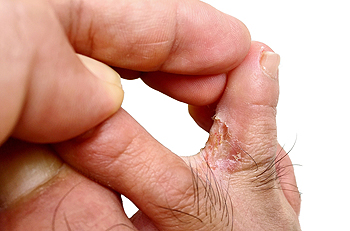 Athletes foot is a condition that typically affects the skin between the toes. A fungal infection is generally the cause of this ailment, and in severe cases, it may cause the skin to crack and bleed. The skin may appear to be warm when touched, and pain is often experienced. This type of infection is contagious and is typically found in public places where people walk barefoot. Pools, showers and changing rooms are among the places where this fungus may live and it’s suggested to wear appropriate shoes while in these areas. If your immune system is weak as a result of other conditions, you may be more susceptible to being afflicted with this ailment. Research has shown that it’s beneficial to consult with a podiatrist who can properly diagnosis and treat athlete’s foot.
Athletes foot is a condition that typically affects the skin between the toes. A fungal infection is generally the cause of this ailment, and in severe cases, it may cause the skin to crack and bleed. The skin may appear to be warm when touched, and pain is often experienced. This type of infection is contagious and is typically found in public places where people walk barefoot. Pools, showers and changing rooms are among the places where this fungus may live and it’s suggested to wear appropriate shoes while in these areas. If your immune system is weak as a result of other conditions, you may be more susceptible to being afflicted with this ailment. Research has shown that it’s beneficial to consult with a podiatrist who can properly diagnosis and treat athlete’s foot.
Athlete’s Foot
Athlete’s foot is often an uncomfortable condition to experience. Thankfully, podiatrists specialize in treating athlete’s foot and offer the best treatment options. If you have any questions about athlete’s foot, consult with one of our podiatrists from PA Foot & Ankle Associates. Our doctors will assess your condition and provide you with quality treatment.
What Is Athlete’s Foot?
Tinea pedis, more commonly known as athlete’s foot, is a non-serious and common fungal infection of the foot. Athlete’s foot is contagious and can be contracted by touching someone who has it or infected surfaces. The most common places contaminated by it are public showers, locker rooms, and swimming pools. Once contracted, it grows on feet that are left inside moist, dark, and warm shoes and socks.
Prevention
The most effective ways to prevent athlete’s foot include:
- Thoroughly washing and drying feet
- Avoid going barefoot in locker rooms and public showers
- Using shower shoes in public showers
- Wearing socks that allow the feet to breathe
- Changing socks and shoes frequently if you sweat a lot
Symptoms
Athlete’s foot initially occurs as a rash between the toes. However, if left undiagnosed, it can spread to the sides and bottom of the feet, toenails, and if touched by hand, the hands themselves. Symptoms include:
- Redness
- Burning
- Itching
- Scaly and peeling skin
Diagnosis and Treatment
Diagnosis is quick and easy. Skin samples will be taken and either viewed under a microscope or sent to a lab for testing. Sometimes, a podiatrist can diagnose it based on simply looking at it. Once confirmed, treatment options include oral and topical antifungal medications.
If you have any questions, please feel free to contact one of our offices located in Allentown, Easton, Northampton, and Chew Street in Allentown, PA . We offer the newest diagnostic and treatment technologies for all your foot care needs.
Reminder: When Was the Last Time...?
The Similarities Between A Sprained Ankle and Cuboid Syndrome
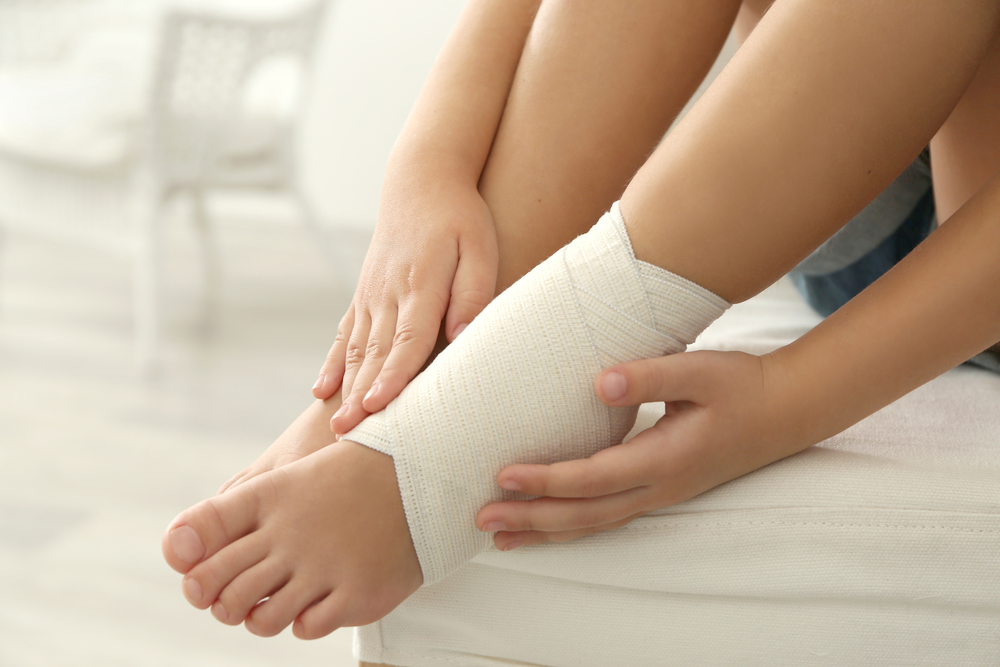 A condition referred to as cuboid syndrome may have similar symptoms as those associated with an ankle sprain. Additionally, the discomfort and pain may be felt on the outside of the ankle and many patients overcompensate by rolling the arches inward. The bone that is called the cuboid bone is found on the outside of the foot, and dislocation may occur from an ankle injury. Treatment may typically consist of aligning the bone correctly in addition to applying tape and adequate padding which may keep the bone from slipping out of place. A condition that is often associated with this ailment is called peroneal tendonitis, which is an inflammation of the tendons that run behind the cuboid bone. For patients who are afflicted with peroneal tendonitis, a rehabilitation program may be suggested which may aid in gradual healing. Please consult with a podiatrist if additional information is required about cuboid syndrome.
A condition referred to as cuboid syndrome may have similar symptoms as those associated with an ankle sprain. Additionally, the discomfort and pain may be felt on the outside of the ankle and many patients overcompensate by rolling the arches inward. The bone that is called the cuboid bone is found on the outside of the foot, and dislocation may occur from an ankle injury. Treatment may typically consist of aligning the bone correctly in addition to applying tape and adequate padding which may keep the bone from slipping out of place. A condition that is often associated with this ailment is called peroneal tendonitis, which is an inflammation of the tendons that run behind the cuboid bone. For patients who are afflicted with peroneal tendonitis, a rehabilitation program may be suggested which may aid in gradual healing. Please consult with a podiatrist if additional information is required about cuboid syndrome.
Cuboid syndrome, also known as cuboid subluxation, occurs when the joints and ligaments near the cuboid bone in the foot become torn. If you have cuboid syndrome, consult with one of our podiatrists from PA Foot & Ankle Associates. Our doctors will assess your condition and provide you with quality foot and ankle treatment.
Cuboid syndrome is a common cause of lateral foot pain, which is pain on the outside of the foot. The condition may happen suddenly due to an ankle sprain, or it may develop slowly overtime from repetitive tension through the bone and surrounding structures.
Causes
The most common causes of cuboid syndrome include:
- Injury – The most common cause of this ailment is an ankle sprain.
- Repetitive Strain – Tension placed through the peroneus longus muscle from repetitive activities such as jumping and running may cause excessive traction on the bone causing it to sublux.
- Altered Foot Biomechanics – Most people suffering from cuboid subluxation have flat feet.
Symptoms
A common symptom of cuboid syndrome is pain along the outside of the foot which can be felt in the ankle and toes. This pain may create walking difficulties and may cause those with the condition to walk with a limp.
Diagnosis
Diagnosis of cuboid syndrome is often difficult, and it is often misdiagnosed. X-rays, MRIs and CT scans often fail to properly show the cuboid subluxation. Although there isn’t a specific test used to diagnose cuboid syndrome, your podiatrist will usually check if pain is felt while pressing firmly on the cuboid bone of your foot.
Treatment
Just as the range of causes varies widely, so do treatments. Some more common treatments are ice therapy, rest, exercise, taping, and orthotics.
If you have any questions, please feel free to contact one of our offices located in Allentown, Easton, Northampton, and Chew Street in Allentown, PA . We offer the newest diagnostic and treatment technologies for all your foot care needs.
Disadvantages of Wearing High Heels
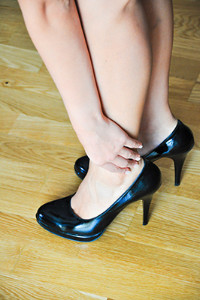 Wearing high heels may possibly be the reason why many women experience foot pain. Despite the fact that most women think high heels flatter the appearance of their legs, several issues may develop as a result of wearing this type of shoe. When high heels are worn, the foot is often in an unnatural position, which may inhibit blood circulation to the feet. The purpose of the Achilles tendon is to connect the calf to the heel. A disadvantage of wearing high heels is that heels may cause this tendon to become stiff and inflamed, possibly resulting in the development of additional foot ailments. Recent research has shown that moderation is the key to wearing high heels, and limiting the number of days they are worn may benefit the overall well-being of the foot. If you experience discomfort and pain from wearing high heels, please consult with a podiatrist to learn about proper stretching techniques for the foot.
Wearing high heels may possibly be the reason why many women experience foot pain. Despite the fact that most women think high heels flatter the appearance of their legs, several issues may develop as a result of wearing this type of shoe. When high heels are worn, the foot is often in an unnatural position, which may inhibit blood circulation to the feet. The purpose of the Achilles tendon is to connect the calf to the heel. A disadvantage of wearing high heels is that heels may cause this tendon to become stiff and inflamed, possibly resulting in the development of additional foot ailments. Recent research has shown that moderation is the key to wearing high heels, and limiting the number of days they are worn may benefit the overall well-being of the foot. If you experience discomfort and pain from wearing high heels, please consult with a podiatrist to learn about proper stretching techniques for the foot.
High heels have a history of causing foot and ankle problems. If you have any concerns about your feet or ankles, contact one of our podiatrists from PA Foot & Ankle Associates. Our doctors can provide the care you need to keep you pain-free and on your feet.
Effects of High Heels on the Feet
High heels are popular shoes among women because of their many styles and societal appeal. Despite this, high heels can still cause many health problems if worn too frequently.
Which Parts of My Body Will Be Affected by High Heels?
- Ankle Joints
- Achilles Tendon – May shorten and stiffen with prolonged wear
- Balls of the Feet
- Knees – Heels cause the knees to bend constantly, creating stress on them
- Back – They decrease the spine’s ability to absorb shock, which may lead to back pain. The vertebrae of the lower back may compress.
What Kinds of Foot Problems Can Develop from Wearing High Heels?
- Corns
- Calluses
- Hammertoe
- Bunions
- Morton’s Neuroma
- Plantar Fasciitis
How Can I Still Wear High Heels and Maintain Foot Health?
If you want to wear high heeled shoes, make sure that you are not wearing them every day, as this will help prevent long term physical problems. Try wearing thicker heels as opposed to stilettos to distribute weight more evenly across the feet. Always make sure you are wearing the proper shoes for the right occasion, such as sneakers for exercising. If you walk to work, try carrying your heels with you and changing into them once you arrive at work. Adding inserts to your heels can help cushion your feet and absorb shock. Full foot inserts or metatarsal pads are available.
If you have any questions please feel free to contact one of our offices located in Allentown, Easton, Northampton, and Chew Street in Allentown, PA . We offer the newest diagnostic and treatment technologies for all your foot and ankle needs.
Pins and Needles Felt During Pregnancy
 Pins and needles is a sensation that occurs when the blood supply to the nerves is cut off. This sometimes happens if you sit or sleep in an awkward position. This feeling normally goes away if you take the weight off the affected body part, which restores the blood supply to the nerves. This sensation is common in pregnancy, and if you are experiencing it in your feet, it may be a sign of gestational diabetes which is a temporary form of the condition that develops during pregnancy. Although pins and needles during pregnancy usually isn't worrisome, you may feel a burning sensation in your feet at times. Please consider scheduling a consultation with a podiatrist for any questions or concerns regarding pins and needles felt in the feet during pregnancy.
Pins and needles is a sensation that occurs when the blood supply to the nerves is cut off. This sometimes happens if you sit or sleep in an awkward position. This feeling normally goes away if you take the weight off the affected body part, which restores the blood supply to the nerves. This sensation is common in pregnancy, and if you are experiencing it in your feet, it may be a sign of gestational diabetes which is a temporary form of the condition that develops during pregnancy. Although pins and needles during pregnancy usually isn't worrisome, you may feel a burning sensation in your feet at times. Please consider scheduling a consultation with a podiatrist for any questions or concerns regarding pins and needles felt in the feet during pregnancy.
Pregnant women with swollen feet can be treated with a variety of different methods that are readily available. For more information about other cures for swollen feet during pregnancy, consult with one of our podiatrists from PA Foot & Ankle Associates. Our doctors will attend to all of your foot and ankle needs.
What Foot Problems Can Arise During Pregnancy?
One problem that can occur is overpronation, which occurs when the arch of the foot flattens and tends to roll inward. This can cause pain and discomfort in your heels while you’re walking or even just standing up, trying to support your baby.
Another problem is edema, or swelling in the extremities. This often affects the feet during pregnancy but tends to occur in the later stages.
How Can I Keep My Feet Healthy During Pregnancy?
- Wearing orthotics can provide extra support for the feet and help distribute weight evenly
- Minimize the amount of time spent walking barefoot
- Wear shoes with good arch support
- Wear shoes that allow for good circulation to the feet
- Elevate feet if you experience swelling
- Massage your feet
- Get regular, light exercise, such as walking, to promote blood circulation to the feet
If you have any questions please feel free to contact one of our offices located in Allentown, Easton, Northampton, and Chew Street in Allentown, PA . We offer the newest diagnostic and treatment technologies for all your foot and ankle needs.
Why Live with Pain and Numbness in Your Feet?
Effective Ways to Prevent Falls
 Research has shown that approximately half the falls that occur at home require the patient to be hospitalized. Falls can lead to the onset of other health issues, so it’s important to be aware of how falling may be prevented. Removing excess clutter, repairing loose carpets which may prevent tripping, and having adequate lighting are effective approaches to preventing falls from occurring. It may be important to have handrails in the shower or bath area to avoid slipping. Seniors may find that living on one level may be helpful in avoiding falling, and if this cannot be accomplished, then extra precautions should be taken when using the stairs. Wearing shoes in the house is recommended instead of wearing socks unless non-slip socks are worn. Additionally, walking slowly and taking the time to complete necessary tasks in the household may aid in the prevention of falling as well.
Research has shown that approximately half the falls that occur at home require the patient to be hospitalized. Falls can lead to the onset of other health issues, so it’s important to be aware of how falling may be prevented. Removing excess clutter, repairing loose carpets which may prevent tripping, and having adequate lighting are effective approaches to preventing falls from occurring. It may be important to have handrails in the shower or bath area to avoid slipping. Seniors may find that living on one level may be helpful in avoiding falling, and if this cannot be accomplished, then extra precautions should be taken when using the stairs. Wearing shoes in the house is recommended instead of wearing socks unless non-slip socks are worn. Additionally, walking slowly and taking the time to complete necessary tasks in the household may aid in the prevention of falling as well.
Preventing falls among the elderly is very important. If you are older and have fallen or fear that you are prone to falling, consult with one of our podiatrists from PA Foot & Ankle Associates. Our doctors will assess your condition and provide you with quality advice and care.
Every 11 seconds, an elderly American is being treated in an emergency room for a fall related injury. Falls are the leading cause of head and hip injuries for those 65 and older. Due to decreases in strength, balance, senses, and lack of awareness, elderly persons are very susceptible to falling. Thankfully, there are a number of things older persons can do to prevent falls.
How to Prevent Falls
Some effective methods that older persons can do to prevent falls include:
- Enrolling in strength and balance exercise program to increase balance and strength
- Periodically having your sight and hearing checked
- Discuss any medications you have with a doctor to see if it increases the risk of falling
- Clearing the house of falling hazards and installing devices like grab bars and railings
- Utilizing a walker or cane
- Wearing shoes that provide good support and cushioning
- Talking to family members about falling and increasing awareness
Falling can be a traumatic and embarrassing experience for elderly persons; this can make them less willing to leave the house, and less willing to talk to someone about their fears of falling. Doing such things, however, will increase the likelihood of tripping or losing one’s balance. Knowing the causes of falling and how to prevent them is the best way to mitigate the risk of serious injury.
If you have any questions, please feel free to contact one of our offices located in Allentown, Easton, Northampton, and Chew Street in Allentown, PA . We offer the newest diagnostic and treatment technologies for all your foot care needs.
More...
Causes of Ingrown Toenails
 The pain of an ingrown toenail can often be uncomfortable and frustrating, and will typically affect the big toe. It generally occurs when the nails are not trimmed correctly, which may cause the side of the nail to grow downward. Additionally, an ingrown toenail may result from wearing shoes that fit poorly. Common symptoms may include the toe appearing red and tender and in severe cases, a discharge may ooze from the affected and surrounding areas. Many patients will benefit from consulting with a podiatrist who may suggest soaking the foot in lukewarm salt water several times per day. This method will soften the skin which may attain moderate relief. If the toenail becomes infected, surgery may be a necessary treatment option for removal of the nail and the infected surrounding tissue. If you would like additional information about how to prevent or treat ingrown toenails, please consult with a podiatrist
The pain of an ingrown toenail can often be uncomfortable and frustrating, and will typically affect the big toe. It generally occurs when the nails are not trimmed correctly, which may cause the side of the nail to grow downward. Additionally, an ingrown toenail may result from wearing shoes that fit poorly. Common symptoms may include the toe appearing red and tender and in severe cases, a discharge may ooze from the affected and surrounding areas. Many patients will benefit from consulting with a podiatrist who may suggest soaking the foot in lukewarm salt water several times per day. This method will soften the skin which may attain moderate relief. If the toenail becomes infected, surgery may be a necessary treatment option for removal of the nail and the infected surrounding tissue. If you would like additional information about how to prevent or treat ingrown toenails, please consult with a podiatrist
Ingrown toenails may initially present themselves as a minor discomfort, but they may progress into an infection in the skin without proper treatment. For more information about ingrown toenails, contact one of our podiatrists of PA Foot & Ankle Associates. Our doctors can provide the care you need to keep you pain-free and on your feet.
Ingrown Toenails
Ingrown toenails are caused when the corner or side of a toenail grows into the soft flesh surrounding it. They often result in redness, swelling, pain, and in some cases, infection. This condition typically affects the big toe and may recur if it is not treated properly.
Causes
- Improper toenail trimming
- Genetics
- Improper shoe fitting
- Injury from pedicures or nail picking
- Abnormal gait
- Poor hygiene
You are more likely to develop an ingrown toenail if you are obese, have diabetes, arthritis, or have any fungal infection in your nails. Additionally, people who have foot or toe deformities are at a higher risk of developing an ingrown toenail.
Symptoms
Some symptoms of ingrown toenails are redness, swelling, and pain. In rare cases, there may be a yellowish drainage coming from the nail.
Treatment
Ignoring an ingrown toenail can have serious complications. Infections of the nail border can progress to a deeper soft-tissue infection, which can then turn into a bone infection. You should always speak with your podiatrist if you suspect you have an ingrown toenail, especially if you have diabetes or poor circulation.
If you have any questions, please feel free to contact one of our offices located in Allentown, Easton, Northampton, and Chew Street in Allentown, PA . We offer the newest diagnostic and treatment technologies for all your foot care needs.
Why Do Corns Develop?
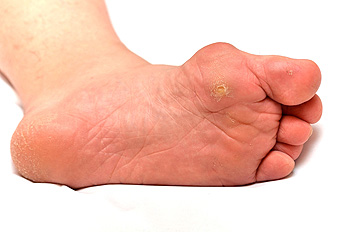 There are several different reasons for why corns on the feet to develop. These may include being on your feet for long stretches of time and wearing poorly fitting shoes that may cause friction. A corn typically resembles a round area of hardened skin that develops on the toes, and generally may cause pain and discomfort. Additionally, corns may form in between the toes, and this is commonly caused by wearing non-absorbent socks that allow moisture to develop. Some patients are able to file the corn, preceded by soaking the foot in warm water. This may enable the corn to soften, making it easier to file. It may be beneficial to use corn pads that will provide a protective layer that can possibly diminish the pressure. It’s advised to consult with a podiatrist for additional information and treatment options about corns.
There are several different reasons for why corns on the feet to develop. These may include being on your feet for long stretches of time and wearing poorly fitting shoes that may cause friction. A corn typically resembles a round area of hardened skin that develops on the toes, and generally may cause pain and discomfort. Additionally, corns may form in between the toes, and this is commonly caused by wearing non-absorbent socks that allow moisture to develop. Some patients are able to file the corn, preceded by soaking the foot in warm water. This may enable the corn to soften, making it easier to file. It may be beneficial to use corn pads that will provide a protective layer that can possibly diminish the pressure. It’s advised to consult with a podiatrist for additional information and treatment options about corns.
If you have any concerns regarding your feet and ankles, contact one of our podiatrists of PA Foot & Ankle Associates. Our doctors will treat your foot and ankle needs.
Corns: What Are They? and How Do You Get Rid of Them?
Corns can be described as areas of the skin that have thickened to the point of becoming painful or irritating. They are often layers and layers of the skin that have become dry and rough, and are normally smaller than calluses.
Ways to Prevent Corns
There are many ways to get rid of painful corns such as wearing:
- Well-fitting socks
- Comfortable shoes that are not tight around your foot
- Shoes that offer support
Treating Corns
Treatment of corns involves removing the dead skin that has built up in the specific area of the foot. Consult with Our doctors to determine the best treatment option for your case of corns.
If you have any questions please feel free to contact one of our offices located in Allentown, Easton, Northampton, and Chew Street in Allentown, PA . We offer the newest diagnostic and treatment technologies for all your foot and ankle needs.
Do Your Child's Feet Hurt?
Symptoms of a Sprained Ankle
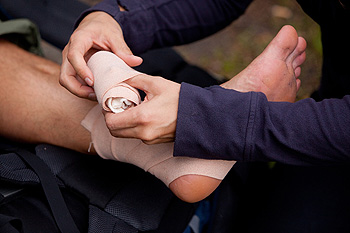 A sprained ankle typically implies that the ankle's ligaments have been torn or twisted. It is considered to be one of the more common foot injuries and is frequently observed in runners or people who partake in any kind of jumping activities. Severe and excruciating pain is often associated with this type of injury, which may make it difficult to walk. Redness and swelling may be noticeable in the affected area of the foot, in addition to the surrounding area appearing bruised. Resting and elevating the ankle may alleviate a portion of the discomfort, and utilizing a compression bandage may curb the swelling. A proper diagnosis will often consist of an X-ray to eliminate the possibility of a fracture. Please consider seeing your podiatrist if you have sustained a sprained ankle.
A sprained ankle typically implies that the ankle's ligaments have been torn or twisted. It is considered to be one of the more common foot injuries and is frequently observed in runners or people who partake in any kind of jumping activities. Severe and excruciating pain is often associated with this type of injury, which may make it difficult to walk. Redness and swelling may be noticeable in the affected area of the foot, in addition to the surrounding area appearing bruised. Resting and elevating the ankle may alleviate a portion of the discomfort, and utilizing a compression bandage may curb the swelling. A proper diagnosis will often consist of an X-ray to eliminate the possibility of a fracture. Please consider seeing your podiatrist if you have sustained a sprained ankle.
Ankle sprains are common but need immediate attention. If you need your feet checked, contact one of our podiatrists from PA Foot & Ankle Associates. Our doctors can provide the care you need to keep you pain-free and on your feet.
How Does an Ankle Sprain Occur?
Ankle sprains take place when the ligaments in your ankle are torn or stretched beyond their limits. There are multiple ways that the ankle can become injured, including twisting or rolling over onto your ankle, putting undue stress on it, or causing trauma to the ankle itself.
What Are the Symptoms?
- Mild to moderate bruising
- Limited mobility
- Swelling
- Discoloration of the skin (depending on severity)
Preventing a Sprain
- Wearing appropriate shoes for the occasion
- Stretching before exercises and sports
- Knowing your limits
Treatment of a Sprain
Treatment of a sprain depends on the severity. Many times, people are told to rest and remain off their feet completely, while others are given an air cast. If the sprain is very severe, surgery may be required.
If you have suffered an ankle sprain previously, you may want to consider additional support such as a brace and regular exercises to strengthen the ankle.
If you have any questions please feel free to contact one of our offices located in Allentown, Easton, Northampton, and Chew Street in Allentown, PA . We offer the newest diagnostic and treatment technologies for all your foot and ankle needs.




